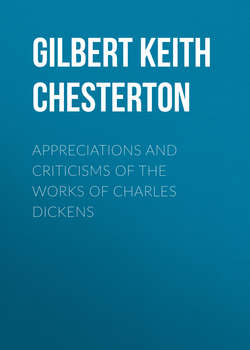Appreciations and Criticisms of the Works of Charles Dickens

Реклама. ООО «ЛитРес», ИНН: 7719571260.
Оглавление
Gilbert Keith Chesterton. Appreciations and Criticisms of the Works of Charles Dickens
INTRODUCTION
LITTLE DORRIT
REPRINTED PIECES
OUR MUTUAL FRIEND
DAVID COPPERFIELD
CHRISTMAS BOOKS
TALE OF TWO CITIES
BARNABY RUDGE
THE UNCOMMERCIAL TRAVELLER
SKETCHES BY BOZ
PICKWICK PAPERS
NICHOLAS NICKLEBY
OLIVER TWIST
OLD CURIOSITY SHOP
BARNABY RUDGE
AMERICAN NOTES
PICTURES FROM ITALY
MARTIN CHUZZLEWIT
CHRISTMAS BOOKS
DOMBEY AND SON
DAVID COPPERFIELD
CHRISTMAS STORIES
BLEAK HOUSE
CHILD’S HISTORY OF ENGLAND
HARD TIMES
LITTLE DORRIT
A TALE OF TWO CITIES
GREAT EXPECTATIONS
OUR MUTUAL FRIEND
EDWIN DROOD
MASTER HUMPHREY’S CLOCK
REPRINTED PIECES
Отрывок из книги
These papers were originally published as prefaces to the separate books of Dickens in one of the most extensive of those cheap libraries of the classics which are one of the real improvements of recent times. Thus they were harmless, being diluted by, or rather drowned in Dickens. My scrap of theory was a mere dry biscuit to be taken with the grand tawny port of great English comedy; and by most people it was not taken at all – like the biscuit. Nevertheless the essays were not in intention so aimless as they appear in fact. I had a general notion of what needed saying about Dickens to the new generation, though probably I did not say it. I will make another attempt to do so in this prologue, and, possibly fail again.
There was a painful moment (somewhere about the eighties) when we watched anxiously to see whether Dickens was fading from the modern world. We have watched a little longer, and with great relief we begin to realise that it is the modern world that is fading. All that universe of ranks and respectabilities in comparison with which Dickens was called a caricaturist, all that Victorian universe in which he seemed vulgar – all that is itself breaking up like a cloudland. And only the caricatures of Dickens remain like things carved in stone. This, of course, is an old story in the case of a man reproached with any excess of the poetic. Again and again when the man of visions was pinned by the sly dog who knows the world,
.....
But this notion of a sneer is not admissible. Dickens was far too frank and generous a writer to employ such an elaborate plot of silence. His satire was always intended to attack, never to entrap; moreover, he was far too vain a man not to wish the crowd to see all his jokes. Vanity is more divine than pride, because it is more democratic than pride. Third, and most important, Dickens was a good Liberal, and would have been horrified at the notion of making so venomous a vendetta against one race or creed. Nevertheless the fact is there, as I say, if only as a curiosity of literature. I defy any man to read through Our Mutual Friend after hearing this suggestion, and to get out of his head the conviction that Lammle is the wrong kind of Jew. The explanation lies, I think, in this, that Dickens was so wonderfully sensitive to that change that has come over our society, that he noticed the type of the oriental and cosmopolitan financier without even knowing that it was oriental or cosmopolitan. He had, in fact, fallen a victim to a very simple fallacy affecting this problem. Somebody said, with great wit and truth, that treason cannot prosper, because when it prospers it cannot be called treason. The same argument soothed all possible Anti-Semitism in men like Dickens. Jews cannot be sneaks and snobs, because when they are sneaks and snobs they do not admit that they are Jews.
I have taken this case of the growth of the cosmopolitan financier, because it is not so stale in discussion as its parallel, the growth of Socialism. But as regards Dickens, the same criticism applies to both. Dickens knew that Socialism was coming, though he did not know its name. Similarly, Dickens knew that the South African millionaire was coming, though he did not know the millionaire’s name. Nobody does. His was not a type of mind to disentangle either the abstract truths touching the Socialist, nor the highly personal truth about the millionaire. He was a man of impressions; he has never been equalled in the art of conveying what a man looks like at first sight – and he simply felt the two things as atmospheric facts. He felt that the mercantile power was oppressive, past all bearing by Christian men; and he felt that this power was no longer wholly in the hands even of heavy English merchants like Podsnap. It was largely in the hands of a feverish and unfamiliar type, like Lammle and Veneering. The fact that he felt these things is almost more impressive because he did not understand them.
.....